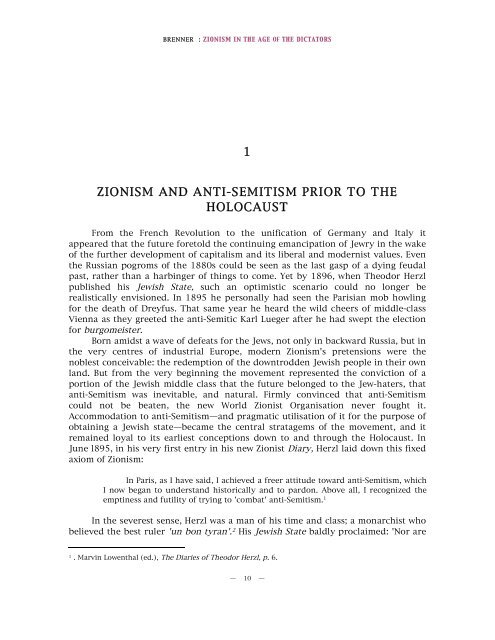Create successful ePaper yourself
Turn your PDF publications into a flip-book with our unique Google optimized e-Paper software.
BRENNER : <strong>ZIONISM</strong> <strong>IN</strong> <strong>THE</strong> <strong>AGE</strong> <strong>OF</strong> <strong>THE</strong> <strong>DICTATORS</strong><br />
1<br />
<strong>ZIONISM</strong> AND ANTI-SEMITISM PRIOR TO <strong>THE</strong><br />
HOLOCAUST<br />
From the French Revolution to the unification of Germany and Italy it<br />
appeared that the future foretold the continuing emancipation of Jewry in the wake<br />
of the further development of capitalism and its liberal and modernist values. Even<br />
the Russian pogroms of the 1880s could be seen as the last gasp of a dying feudal<br />
past, rather than a harbinger of things to come. Yet by 1896, when Theodor Herzl<br />
published his Jewish State, such an optimistic scenario could no longer be<br />
realistically envisioned. In 1895 he personally had seen the Parisian mob howling<br />
for the death of Dreyfus. That same year he heard the wild cheers of middle-class<br />
Vienna as they greeted the anti-Semitic Karl Lueger after he had swept the election<br />
for burgomeister.<br />
Born amidst a wave of defeats for the Jews, not only in backward Russia, but in<br />
the very centres of industrial Europe, modern Zionism's pretensions were the<br />
noblest conceivable: the redemption of the downtrodden Jewish people in their own<br />
land. But from the very beginning the movement represented the conviction of a<br />
portion of the Jewish middle class that the future belonged to the Jew-haters, that<br />
anti-Semitism was inevitable, and natural. Firmly convinced that anti-Semitism<br />
could not be beaten, the new World Zionist Organisation never fought it.<br />
Accommodation to anti-Semitism—and pragmatic utilisation of it for the purpose of<br />
obtaining a Jewish state—became the central stratagems of the movement, and it<br />
remained loyal to its earliest conceptions down to and through the Holocaust. In<br />
June l895, in his very first entry in his new Zionist Diary, Herzl laid down this fixed<br />
axiom of Zionism:<br />
In Paris, as I have said, I achieved a freer attitude toward anti-Semitism, which<br />
I now began to understand historically and to pardon. Above all, I recognized the<br />
emptiness and futility of trying to 'combat' anti-Semitism. 1<br />
In the severest sense, Herzl was a man of his time and class; a monarchist who<br />
believed the best ruler 'un bon tyran'. 2 His Jewish State baldly proclaimed: 'Nor are<br />
1 . Marvin Lowenthal (ed.), The Diaries of Theodor Herzl, p. 6.<br />
— 10 —


